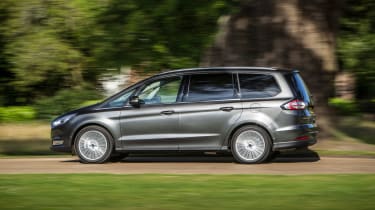Ford Galaxy review - MPG, running costs & CO2 (2015-2023)
Running costs for the Ford Galaxy are reasonably low all round, but it's worth sticking with a diesel
Despite the size of the Galaxy, its fuel economy and CO2 emission figures are very reasonable. They don’t put the car at the top of the class in this area (that honour goes to the Citroen Grand C4 SpaceTourer) but are more than acceptable when you consider the extra space on offer.
Ford Galaxy MPG & CO2
The Galaxy is now powered exclusively by a full-hybrid set-up, which doesn't require plugging in to a charger. Instead, the battery is topped-up using energy harvested while driving, providing enough juice to assist the petrol engine under acceleration. It's a reasonably efficient system, giving the Galaxy economy figures of 43.5mpg with 148g/km of CO2 emissions.
Previously, the Galaxy range was powered by a 2.0-litre EcoBlue diesel engine. Two versions were available, with either 148 or 187bhp. In entry-level 148bhp form, and when equipped with a six-speed manual gearbox and 17-inch alloy wheels, the Zetec model was capable of up to 46.3mpg with CO2 emissions of 160g/km. Adding the eight-speed automatic gearbox reduced economy slightly to 43.5mpg with emissions of 171g/km. Both versions sit in the higher Benefit-in-Kind bands.
The more powerful 187bhp engine was reserved for Titanium models and came with an eight-speed automatic gearbox as standard with the option of four-wheel drive. In front-wheel-drive spec, this engine achieved up to 43.5mpg and CO2 emissions of 171g/km, putting it on par with the automatic version of the 148bhp model.
Combining four-wheel drive with the eight-speed automatic gearbox reduced efficiency somewhat, with the car’s CO2 output climbing to 184g/km and fuel economy falling to 40.4mpg.
Galaxy road tax is charged at the slightly reduced rate for the hybrid, but it's easy to pass the £40,000 mark with just a few options, at which point a surcharge is applied in years two to six of ownership.













